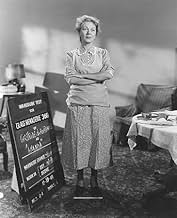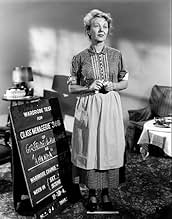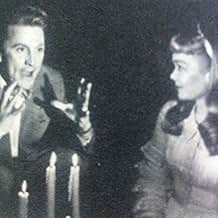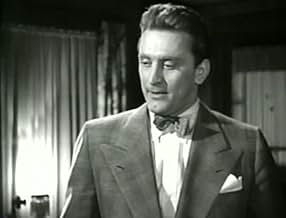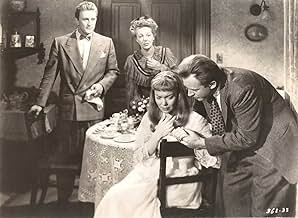AVALIAÇÃO DA IMDb
7,0/10
1,3 mil
SUA AVALIAÇÃO
Adicionar um enredo no seu idiomaMerchant marine officer Tom Wingfield reminisces about his life in St. Louis where he had lived with his nagging mother Amanda and crippled shy sister Laura.Merchant marine officer Tom Wingfield reminisces about his life in St. Louis where he had lived with his nagging mother Amanda and crippled shy sister Laura.Merchant marine officer Tom Wingfield reminisces about his life in St. Louis where he had lived with his nagging mother Amanda and crippled shy sister Laura.
- Direção
- Roteiristas
- Artistas
- Prêmios
- 1 vitória no total
Philip Ahn
- Sailor
- (não creditado)
Chris Alcaide
- Eddie
- (não creditado)
Richard Bartell
- Barman
- (não creditado)
Peter Camlin
- Sailor
- (não creditado)
Perdita Chandler
- Girl in Bar
- (não creditado)
Victor Desny
- Sailor
- (não creditado)
Sarah Edwards
- Mrs. Miller
- (não creditado)
James Horne Jr.
- A Caller
- (não creditado)
Louise Lorimer
- Miss Porter
- (não creditado)
Sean McClory
- Richard
- (não creditado)
Avaliações em destaque
It's hard for a production of a classic stage play not to be stagy. In the Windfield house we have the mother possessed with her children. She launches into diatribes relating to their shortcomings. Laura is crippled and shy and really has no social life. Her brother has a life of his own (event though he still lives in the family home), but is at the beck and call of the mother. She finally pushes him until he invites a friend to dinner. The object is to find a potential mate for Laura. It doesn't take a rocket scientist to see the potential pitfalls. This man is sensitive and understanding of the situation. That's as far as it goes, however. This is one of Tennessee Williams' finest plays, fraught with symbolism, submerged in despair. The fragility of glass is what this is all about. People are indeed breakable.
I got spoiled when I watched 1973's The Glass Menagerie; the 1950 version didn't stand a chance when I finally rented it. Katharine Hepburn's class, Sam Waterston's passion, and Joanna Miles's shyness are incomparable. Halfway through the 1950 version with Gertrude Lawrence, Arthur Kennedy, and Jane Wyman, I stopped my curses and comparisons to the taped Broadway performance. I suddenly realized that the earlier version was the original, and since it came first, it deserved fresh eyes and an open mind. With that in mind, I made sure to be less critical during the second half of the movie.
The Glass Menagerie is a Tennessee Williams play, so it's a depressing family drama about a struggling family in the South, in particular, a frustrated young man and his overbearing mother. The patriarch has deserted the family decades ago, and the young man has given up his dreams to work in a factory and take care of his mother and crippled sister.
While in the '70s, Sam Waterston played the character as a young man who sacrificed his youth for his family and doesn't want that pattern to continue for the rest of his life, Arthur Kennedy comes across as an older character, one whose youth has long since passed by. He isn't passionate and desperate to break free; he's resigned to his fate, but still unhappy about it. It's a very different interpretation from the way Sam played the part, but it's equally good. I'm not one to use the phrase "apples and oranges", but in his own way, Arthur does just as good a job as Sam.
The way Katharine Hepburn played her character, audiences can see how charming she used to be in her youthful Southern belle days. She still retains her class and poise in her old age. Gertrude Lawrence is more beaten down and shabby, fitting in with her poor surroundings. Katharine Hepburn is in a league of her own, but Gertrude Lawrence does give a good performance.
I couldn't really come up with a reason for Jane Wyman's interpretation of the sister character. She hardly seemed shy, and she seemed more mentally slow than anything, from her wide-eyed blank stare at her mother, to her sudden fits with no subtle build-up, and the variance of her limp. The one person who was hands-down, no-contest, infinitely better than the Broadway revival was Kirk Douglas, who played the gentleman caller. While he has the smallest part in the show, and he's given so many wonderful performances over the years, I hesitate to say this is one of his best performances, but it's certainly one of his most underrated ones. Usually, Kirk Douglas is either remembered as a bad boy or in a loincloth. In The Glass Menagerie, he plays the absolute antithesis of his usual bad boy roles, and he's fantastic. He aces every facet of his written character. He's supposed to be perfect and wondrous and kind, the image that comes to mind when one thinks of the bygone name "gentleman caller". A gentleman caller is polite, amiable, clean cut, confident, entertaining, and says nothing that couldn't be overheard by your parents. There isn't a hint of rebellion or seduction in Kirk Douglas's performance, and he sets the bar so high no one else can ever hope to play the gentleman caller half as well.
All in all, this version of The Glass Menagerie is pretty good, unless you've seen the 1973 version and believe that's the one and only interpretation. You might want to watch this one first, or just keep an open mind after the remake. Kirk Douglas fans will definitely want to rent this, and if you really like the story, as I do, you might enjoy watching every version you can get your hands on.
The Glass Menagerie is a Tennessee Williams play, so it's a depressing family drama about a struggling family in the South, in particular, a frustrated young man and his overbearing mother. The patriarch has deserted the family decades ago, and the young man has given up his dreams to work in a factory and take care of his mother and crippled sister.
While in the '70s, Sam Waterston played the character as a young man who sacrificed his youth for his family and doesn't want that pattern to continue for the rest of his life, Arthur Kennedy comes across as an older character, one whose youth has long since passed by. He isn't passionate and desperate to break free; he's resigned to his fate, but still unhappy about it. It's a very different interpretation from the way Sam played the part, but it's equally good. I'm not one to use the phrase "apples and oranges", but in his own way, Arthur does just as good a job as Sam.
The way Katharine Hepburn played her character, audiences can see how charming she used to be in her youthful Southern belle days. She still retains her class and poise in her old age. Gertrude Lawrence is more beaten down and shabby, fitting in with her poor surroundings. Katharine Hepburn is in a league of her own, but Gertrude Lawrence does give a good performance.
I couldn't really come up with a reason for Jane Wyman's interpretation of the sister character. She hardly seemed shy, and she seemed more mentally slow than anything, from her wide-eyed blank stare at her mother, to her sudden fits with no subtle build-up, and the variance of her limp. The one person who was hands-down, no-contest, infinitely better than the Broadway revival was Kirk Douglas, who played the gentleman caller. While he has the smallest part in the show, and he's given so many wonderful performances over the years, I hesitate to say this is one of his best performances, but it's certainly one of his most underrated ones. Usually, Kirk Douglas is either remembered as a bad boy or in a loincloth. In The Glass Menagerie, he plays the absolute antithesis of his usual bad boy roles, and he's fantastic. He aces every facet of his written character. He's supposed to be perfect and wondrous and kind, the image that comes to mind when one thinks of the bygone name "gentleman caller". A gentleman caller is polite, amiable, clean cut, confident, entertaining, and says nothing that couldn't be overheard by your parents. There isn't a hint of rebellion or seduction in Kirk Douglas's performance, and he sets the bar so high no one else can ever hope to play the gentleman caller half as well.
All in all, this version of The Glass Menagerie is pretty good, unless you've seen the 1973 version and believe that's the one and only interpretation. You might want to watch this one first, or just keep an open mind after the remake. Kirk Douglas fans will definitely want to rent this, and if you really like the story, as I do, you might enjoy watching every version you can get your hands on.
Having never been a lover of Williams' writing have to admit this is the only title I regard with any true affection (maybe this has more to do with the adaption). Jayne Wyman is perfection as the shy club-footed daughter of suffocatingly controlling mother Amanda Wingfield (Gertrude Lawrence) - with Arthur Kennedy doing some of his best work as her brother Tom (with a rough likeness to Williams) Kirk Douglas scores well in an early role, as the 'gentleman caller', coming for dinner at the request of the brother (with much input from mother!) It's a tender and thoughtful musing on how, with the right words and actions, a brief meeting can bring new meaning to a sheltered life.
It's a pity Williams' life took such a destructive course as more stories like this would have been welcome. This version may not please everyone but with sensitive direction by Irvine Rapper and sterling visual work by prolific cinematographer Robert Burks --they extract a broad spectrum of human emotions from the limited settings --making this another of those neglected masterpieces from some of Hollywood's most effective years.
It's odd that it appears to be a Warner Bros production but came to us through 20th Century Fox; - It's more than ready for a remastered DVD release... from whoever it actually belongs to.
It's a pity Williams' life took such a destructive course as more stories like this would have been welcome. This version may not please everyone but with sensitive direction by Irvine Rapper and sterling visual work by prolific cinematographer Robert Burks --they extract a broad spectrum of human emotions from the limited settings --making this another of those neglected masterpieces from some of Hollywood's most effective years.
It's odd that it appears to be a Warner Bros production but came to us through 20th Century Fox; - It's more than ready for a remastered DVD release... from whoever it actually belongs to.
The Glass Menagerie (1950) :
Brief Review -
Tennessee Williams' classic and perhaps the best story ever gets the best cinematic adaptation at the hands of Irving Rapper. Tennessee's Cat on a Hot Tin Roof and A Streetcar Named Desire may have been popular, but I found them a little overrated. Today, my thoughts are empowered by The Glass Menagerie (adopted 4 times), as I found this one much better due to its realistic take on life. As mentioned by many, this one is a close account of Williams' life with a deliberate happy ending, which is not fulfilled but bleak. Pardon me for saying this, but I found this film 'storyless'. There was no story. Just a few moments of a family together and their struggle/success and you have The Glass Menagerie ready for you. Yet, this one moved me and engrossed me as a viewer, which is a big thing. The film is about a caring mother who wants her son to be settled well and her sick daughter to be mingled with a handsome young man. The son is working at a warehouse and is sick of the job. He wants to explore and go places, but his mother keeps pushing him to bring young men to the house and find a partner for his crippled sister. The sister lacks confidence, while the mother is all about swag and royal stature. I couldn't have imagined that Gertrude Lawrence had the nerves to overshadow Arthur Kennedy, Jane Wyman and Kirk Douglas in a four-actor film. What a presentation of a caring mother, and what an accent she carried throughout the film. Simply unbeatable. Jane Wyman shines as Laura, and I can't imagine any other actress playing this role better than her. Arthur Kennedy and Kirk Douglas go hand-in-hand as far as male bonding is concerned, as well as individually. "Dancing is the most civilised form of social intercourse" has to be my favourite quote, apart from that final monologue by Tom. I'll always be thankful to Irving Rapper for "The Corn is Green" (1942), but I didn't like "Now, Voyager" (1942) much. This one landed exactly in the middle.
RATING - 7/10*
By - #samthebestest.
Tennessee Williams' classic and perhaps the best story ever gets the best cinematic adaptation at the hands of Irving Rapper. Tennessee's Cat on a Hot Tin Roof and A Streetcar Named Desire may have been popular, but I found them a little overrated. Today, my thoughts are empowered by The Glass Menagerie (adopted 4 times), as I found this one much better due to its realistic take on life. As mentioned by many, this one is a close account of Williams' life with a deliberate happy ending, which is not fulfilled but bleak. Pardon me for saying this, but I found this film 'storyless'. There was no story. Just a few moments of a family together and their struggle/success and you have The Glass Menagerie ready for you. Yet, this one moved me and engrossed me as a viewer, which is a big thing. The film is about a caring mother who wants her son to be settled well and her sick daughter to be mingled with a handsome young man. The son is working at a warehouse and is sick of the job. He wants to explore and go places, but his mother keeps pushing him to bring young men to the house and find a partner for his crippled sister. The sister lacks confidence, while the mother is all about swag and royal stature. I couldn't have imagined that Gertrude Lawrence had the nerves to overshadow Arthur Kennedy, Jane Wyman and Kirk Douglas in a four-actor film. What a presentation of a caring mother, and what an accent she carried throughout the film. Simply unbeatable. Jane Wyman shines as Laura, and I can't imagine any other actress playing this role better than her. Arthur Kennedy and Kirk Douglas go hand-in-hand as far as male bonding is concerned, as well as individually. "Dancing is the most civilised form of social intercourse" has to be my favourite quote, apart from that final monologue by Tom. I'll always be thankful to Irving Rapper for "The Corn is Green" (1942), but I didn't like "Now, Voyager" (1942) much. This one landed exactly in the middle.
RATING - 7/10*
By - #samthebestest.
Glass Menagerie, The (1950)
*** (out of 4)
Excellent performances make up for a slow pace in this adaptation of the Tennessee Williams play. An aging Southern Belle (Gertrude Lawrence) makes life horrible for her ambitious son (Arthur Kennedy) and crippled daughter (Jane Wyman) because of her dreams of what life should be. She hopes to get her daughter married off, unable to see her faults and she thinks she has a shot when her son bring home a man (Kirk Douglas) he works with. I really wasn't sure what to expect from this film after reading a few negative reviews but I was pleasantly surprised to see that it was worth watching due in large part to the terrific performances by the entire cast. I was really shocked to see how well the entire cast handled the dialogue and how easy it came off for everyone. Lawrence really stands out as the overbearing mother who you just want to hate yet she's so annoying that she becomes charming after a while. I thought Lawrence did a terrific job at playing both sides of the coin because you do hate her for the way she treats her children but when the stranger shows up, she changes to someone completely different. Just check her performance when this stranger tells her something she didn't know. Wyman is also excellent as the shy and cripple daughter. She too got into the role quite well and made us believe everything about the character. Both Kennedy and Douglas also turn in fine performance and most importantly is how well all four act together. I think director Rapper could have pushed the film a little faster as the pace gets very slow after a while but this is just a small complaint. As with many of Williams' stories, this one here had quite a bit cut out to get pass the censors but in the end this is still worth viewing thanks to the cast.
*** (out of 4)
Excellent performances make up for a slow pace in this adaptation of the Tennessee Williams play. An aging Southern Belle (Gertrude Lawrence) makes life horrible for her ambitious son (Arthur Kennedy) and crippled daughter (Jane Wyman) because of her dreams of what life should be. She hopes to get her daughter married off, unable to see her faults and she thinks she has a shot when her son bring home a man (Kirk Douglas) he works with. I really wasn't sure what to expect from this film after reading a few negative reviews but I was pleasantly surprised to see that it was worth watching due in large part to the terrific performances by the entire cast. I was really shocked to see how well the entire cast handled the dialogue and how easy it came off for everyone. Lawrence really stands out as the overbearing mother who you just want to hate yet she's so annoying that she becomes charming after a while. I thought Lawrence did a terrific job at playing both sides of the coin because you do hate her for the way she treats her children but when the stranger shows up, she changes to someone completely different. Just check her performance when this stranger tells her something she didn't know. Wyman is also excellent as the shy and cripple daughter. She too got into the role quite well and made us believe everything about the character. Both Kennedy and Douglas also turn in fine performance and most importantly is how well all four act together. I think director Rapper could have pushed the film a little faster as the pace gets very slow after a while but this is just a small complaint. As with many of Williams' stories, this one here had quite a bit cut out to get pass the censors but in the end this is still worth viewing thanks to the cast.
Você sabia?
- CuriosidadesIn his 1988 autobiography "The Ragman's Son," Kirk Douglas says that he thinks that the effectiveness of this movie was hampered by Gertrude Lawrence's vanity, since the filmmakers were obliged to add scenes that made her character look younger and more appealing. Douglas also says that he prefers the 1987 film version directed by Paul Newman.
- Citações
Jim O'Connor: Ah, when you first meet Mendoza, you don't like him. But, when you get to know him, you hate him.
Principais escolhas
Faça login para avaliar e ver a lista de recomendações personalizadas
- How long is The Glass Menagerie?Fornecido pela Alexa
Detalhes
- Data de lançamento
- País de origem
- Central de atendimento oficial
- Idioma
- Também conhecido como
- The Glass Menagerie
- Locações de filme
- Empresa de produção
- Consulte mais créditos da empresa na IMDbPro
Bilheteria
- Orçamento
- US$ 1.357.000 (estimativa)
- Tempo de duração1 hora 47 minutos
- Cor
- Proporção
- 1.37 : 1
Contribua para esta página
Sugerir uma alteração ou adicionar conteúdo ausente

Principal brecha
By what name was Algemas de Cristal (1950) officially released in India in English?
Responda
